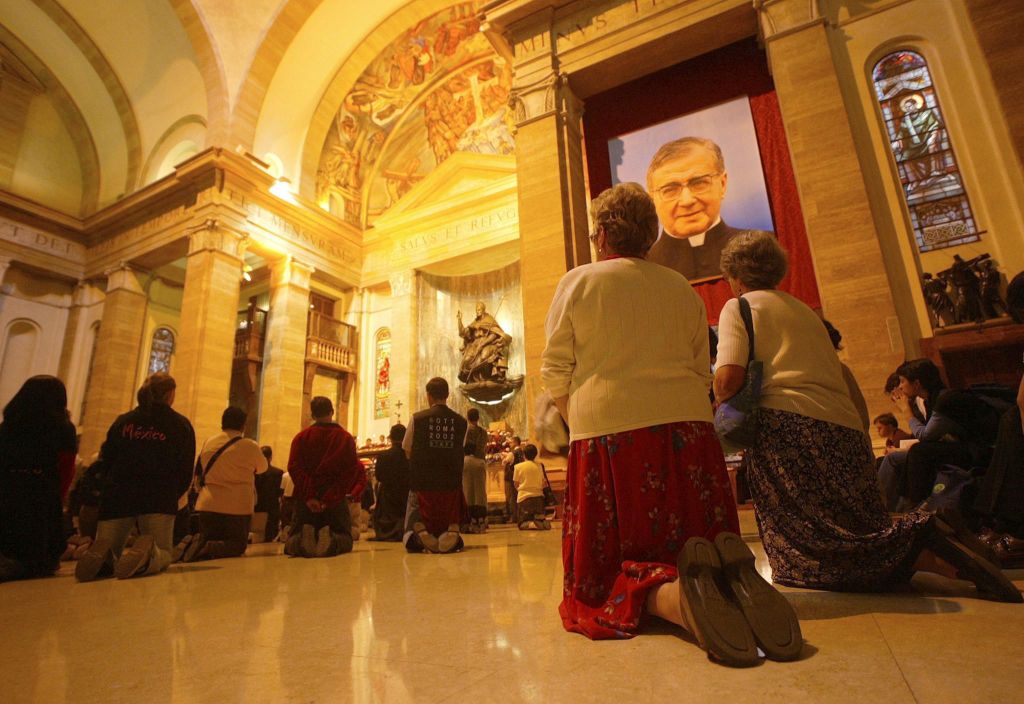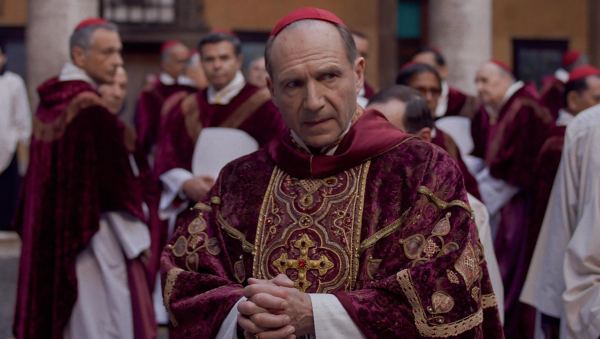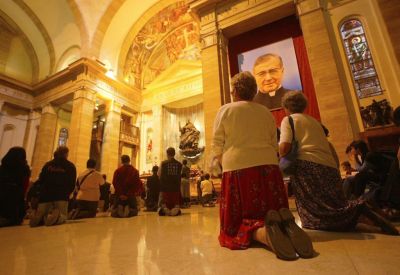To put it bluntly, Opus Dei has a big problem.
In the nearly 100 years since its founding, countless stories have emerged about leaders, priests, and lay members in the Catholic Church’s sole “personal prelature”—a kind of floating diocese defined not by geography but by a set of practices and devotions—embroiled in scandal. Members have been tied to fraud and financial crime. Tell-all books and lurid novels have portrayed its founder, Josemaría Escrivá, as a villain. And its guiding ethos, the “sanctification of everyday life,” seems to be frequently conflated with career ambition at best and authoritarian right-wing politics at worst.
Why is Opus Dei so seemingly scandal-ridden? Determining that answer matters if the prelature is to be reformed, as Pope Francis appears intent on doing. But assuming there’s more to it than just a media phenomenon, it’s often been unclear what kind of problem the prelature’s critics are even trying to identify. Is the ultimate source of Opus Dei’s scandals personal or structural? Religious errors or worldly temptations? Individual bad actors or a top-down, globe-spanning conspiracy?
Financial journalist Gareth Gore’s new book Opus: The Cult of Dark Money, Human Trafficking, and Right-Wing Conspiracy inside the Catholic Church insists the answer is all of the above. Meant at first to be about the collapse of a major numerary-led Spanish bank, Opus takes the reader down branching rabbit holes into the biography of Escrivá, through a series of financial and abuse scandals, then finally into an ecosystem of right-of-center political nonprofits in the United States. In all these sub-topics, Gore argues that Opus Dei, its priests, and its lay members have committed abuse, fraud, trafficking, and more; are obsessed with power, money, and interpersonal control; and aim to remake the world according to a right-wing political agenda.
To its credit, Opus raises enough compelling evidence to establish some serious problems, especially with the treatment of female “numerary assistants.” Nevertheless, it never quite settles on a single idea about what kind of problem Opus Dei has. That’s because for Gore, every aspect of Opus Dei, no matter how small, is a problem.
From the first chapter, Opus describes the daily routines of Opus Dei numeraries with cultish clichés. Measures taken to entice new members are always “lovebombing.” The time numeraries set aside each day for prayer and “personal introspection” leave them “barely a moment to think for themselves.” (One might wonder what prayer and personal introspection are, if not thinking for oneself.) Opus presents these activities in the same ominous tones as more obviously serious allegations, like the surveillance of members.
But if everything is equally problematic, it’s nearly impossible to determine the scope of any single problem. Consider the way Opus discusses allegations that Father C. John McCloskey, an Opus Dei priest stationed in Princeton and Washington, D.C., had broken the seal of confession. McCloskey’s actions, Gore writes, reflected “a widespread technique used by some in Opus Dei who sometimes shared information gathered in the confessional” (emphasis added).
That’s an odd way of putting it. The practice is “widespread,” but only among “some,” who do it “sometimes.” What, then, is the extent of this claim? Are readers supposed to think breaking the seal of confession is systemic, built into the structure of Opus Dei? Or are we supposed to think that Opus Dei leadership explicitly requires it? Or that Opus Dei regularly neglects to explain confession in the formation of its priests? If Gore’s “widespread technique” sentence has any veracity whatsoever, it’s vital to know the scope of its claim and the extent of the evidence for it.
Unfortunately, Opus muddies the waters beyond any hope of disambiguation as to its scope. As for the evidence, while it draws on interviews to discuss specific accusations against McCloskey, the book provides no citation for the “widespread technique” sentence, nor any other examples of specific priests allegedly breaking the seal of confession. After Opus’ release, Opus Dei responded with categorical denial that its priests violate the seal of confession. Its statement uses direct language which makes clear the scope of the accusation and its implications—a refreshing contrast to the original.
Nor is the confession claim the sole instance of Opus dropping a religious bombshell backed by less-than-convincing evidence.
Gore alleges that in 1967, amid tension with the Vatican over Opus Dei’s canonical status, then-second in command Álvaro del Portillo took a trip to Greece “to see whether he might bring the movement into the Orthodox Church” and make “a complete rupture with the Catholic Church”—in a word, schism. To support this claim, Opus cites a 1992 Newsweek article on Escrivá’s canonization process. The problem, however, is that the article does not establish that del Portillo went to Greece for the reasons Opus alleges. It merely quotes a former Opus Dei member making such a claim 25 years after the fact and prints the prelature’s responding statement that del Portillo went to Greece for different reasons. It provides no material evidence or third-party corroboration of the former member’s accusation, nor does it pretend to; this did not stop Opus from restating the accusation as fact.
By the end of Opus, of course, it’s clear enough that Gore’s real concern is not religious, but political. Almost the entire second half of the book, as well as numerous asides throughout the first, is devoted to institutions advocating for socially conservative causes in the United States. Specifically, Opus delves into the connections between conservative judicial activists (focusing on Leonard Leo, the longtime vice president of the Federalist Society, who is not in Opus Dei) and educational institutions (especially any connected to Robert P. George, a professor at Princeton University who was called “the conservative-Christian big thinker” by the New York Times, who is also not in Opus Dei).
(In the interest of disclosure: I have attended mass and other events at the Opus Dei-run Catholic Information Center, which Opus describes as this network’s Washington, D.C., headquarters, and met in passing some of the people named as part of the web of conspiracy. Nobody tried to recruit me for Opus Dei.)
Opus does not establish or even explicitly claim that this network operates on the direct orders of Opus Dei, though it names several numeraries who have worked with Leo and George on various projects. Nor does it accuse Leo, George, or their coworkers of any illegality. So where’s the scandal? That lobbying, issue advocacy, or special interest groups exist, or that large sums of money change hands between them, is hardly unusual in American politics. The scandal appears to be simply that people who object to abortion or same-sex marriage would associate, organize, and support each other’s work.
Yet Opus refers to this network as “the most consequential force in American politics.” This characterization might have been plausible in the immediate aftermath of Dobbs v. Jackson, but not after Donald Trump spent his entire 2024 campaign distancing himself from the pro-life movement. Even in 2017, at arguably the height of his influence, Leo said of Trump’s electoral victory and (temporary) sympathy that “your breaks take you by surprise as much as your setbacks. … Politics is like the rest of life—we don’t always control events as much as we like to think.” Opus quotes this line but nonetheless insists that its speaker exerts immense control over events.
As with Opus Dei itself, there are real criticisms to be had of this network of conservative Catholic nonprofits. One could argue that they over-emphasize one aspect of Catholic social doctrine (sexual morals) to the detriment of others (immigration, poverty, peace) and that they do so because they draw from the same small-bourgeois or professional class from which Opus Dei recruits. But that would require asking why people believe what they believe—meaning either taking their own arguments for their positions seriously or committing to a specific type of analysis that might identify exactly what type of problem (personal, systemic, etc.) we’re dealing with.
Absent that, the source of Opus Dei’s big problem—its proclivity to scandal—remains mysterious. The best solution Gore can muster is that the Church posthumously excommunicate Escrivá and del Portillo and revoke their beatification. This proposal, from a Catholic perspective, is gibberish. And from a broader perspective, it reduces the issue, after all of Opus’ insistence that Opus Dei has every kind of problem, to the merely personal. Opus ends just as so many other conspiracy stories do: Having spun a globe-spanning web of intrigue and misdeeds, both proven and merely presumed, it contents itself with chasing ghosts.






Please note that we at The Dispatch hold ourselves, our work, and our commenters to a higher standard than other places on the internet. We welcome comments that foster genuine debate or discussion—including comments critical of us or our work—but responses that include ad hominem attacks on fellow Dispatch members or are intended to stoke fear and anger may be moderated.
With your membership, you only have the ability to comment on The Morning Dispatch articles. Consider upgrading to join the conversation everywhere.